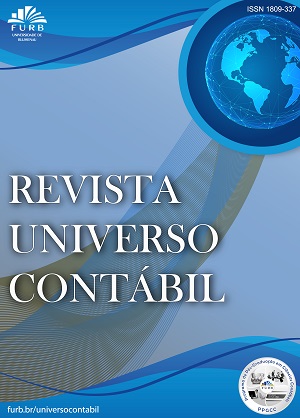IDENTIFICACIÓN DE MECANISMOS DE GOBERNANZA DE LA INFORMACIÓN CONTABLE
DOI:
https://doi.org/10.4270/ruc.2021427Palabras clave:
Mecanismos, Gobernanza, Información Contable, Gobernanza de la Información, Gobernanza de TIResumen
La contabilidad ha enfrentado desafíos relacionados con el volumen de información y el impacto de las nuevas tecnologías. Un enfoque para mejorar el uso y la gestión de estos recursos es el gobierno de la información. El artículo tiene como objetivo identificar los mecanismos que se pueden utilizar para gobernar la información contable, teniendo como elementos rectores los Mecanismos de Gobierno de TI y de Gobierno de la Información. Comienza con una revisión sistemática de la literatura, presentando una lista consolidada de Mecanismos de Gobernanza (TI e Información) basados en Procesos, Estructura y prácticas de Relación. Posteriormente, se realizaron entrevistas con expertos contables para obtener un listado de estos mecanismos adaptados a la Contabilidad. Los aportes del estudio se enfocan en la presentación consolidada de Procesos, Estructuras y mecanismos de Relación que no pretenden agotar el tema, y en su utilización para una mejor toma de decisiones.
Descargas
Citas
Abraham, R., Schneider, J., & Brocke, J. V. (2019). Data governance: A conceptual framework, structured review, and research agenda. International Journal of Information Management. 49, 424-438.
Alhassan, I., Sammon, D., & Daly, M. (2018). Data governance activities: A comparison between scientific and practice-oriented literature. Journal of Enterprise Information Management, 31 (2), 300-316.
Arnaboldi, M., Busco, C., & Cuganesan, S. (2017). Accounting, accountability, social media and big data: Revolution or hype? Accounting, Auditing & Accountability Journal, 30 (4), 762-776.
Cockcroft, S., & Russell, M. (2018). Big data opportunities for accounting and finance practice and research. Australian Accounting Review, 28(86), 323-333.
Coyne, E. M., Coyne, J. G., & Walker, K. B. (2018). Big data information governance by accountants. International Journal of Accounting & Information Management, 26 (1), 153-170.
Demarquet, G. (2016). Five key reasons enterprise data governance matters to finance ... and seven best practices to get you there. Journal of Corporate Accounting and Finance. 47-51.
De Haes, S., & Van Grembergen, W. (2009). Exploring the relationship between IT governance practices and business/IT alignment through extreme case analysis in Belgian mid-to-large size financial enterprises. Journal of Enterprise Information Management, 22 (5), 615-637.
Faria, F. A., Maçada, A. C. G., & Kumar, K. (2017). Modelo estrutural de governança da informação para bancos. RAE-Revista de Administração de Empresas, 57 (1), 79-95.
Huerta, E., & Jensen, S. (2017). An accounting information systems perspective on data analytics and big data. Journal of Information Systems, 31 (3), p. 101-114.
Khatri, V., & Brown, C. V. (2010). Designing data governance. Communications of the ACM, 53(1), 148-152.
Kooper, M. N., Maes, R., & Lindgreen, E. E. O. R. (2011). On the governance of information: Introducing a new concept of governance to support the management of information. International Journal of Information Management, 31 (3), 195–200.
Lajara, T. T.; & Maçada, A. C. G. (2013). Information governance framework: The defense manufacturing case study. Proceedings of the Nineteenth Americas Conference on Information Systems (AMCIS), Chicago, EUA.
Lunardi, G. L., Becker, J. L., Maçada, A. C. G., & Dolci, P. C. (2014). The impact of adopting IT governance on financial performance: An empirical analysis among Brazilian firms. International Journal of Accounting Information Systems, 15, 66-81.
Lunardi, G., Maçada, A. C. G., Becker, J., & Van Grembergen, W. (2017). Antecedents of IT governance effectiveness: An empirical examination in Brazilian firms. Journal of Information Systems, 31(1), 41-57.
Otto, B. (2011). Organizing Data governance: Findings from the telecommunications industry and consequences for large service providers. Communications of the Association for Information Systems, 29 (3), 45-66.
Peterson, R. (2004). Crafting Information Technology Governance. Information Systems Management, 21 (4), 7-22.
Pricewaterhousecoopers (PWC). (2018). Pesquisa Global de Segurança da Informação. Recuperado de https://www.pwc.com.br/pt/global-state-of-information-security-survey-2018/revigorando-a-privacidade-e-a-confianca-em-um-mundo-baseado-em-dados.html.
Rikhardsson, P., & Yigitbasioglub, O. (2018). Business intelligence; analytics in management accounting research: Status and future focus. International Journal of Accounting Information Systems.
Tallon, P. P., Ramirez, R. V., & Short, J. E. (2013a). The information artifact in IT governance: Toward a theory of information governance. Journal of Management Information Systems, (30) 3, 141–177.
Tallon, P. P., Short, J. E., & Harkins, M. W. (2013b). The evolution of information governance at Intel. MIS Quarterly Executive, (12) 4, 189-198.
Ward, S., & Carter, D. (2019). Information as an asset todays board agenda: The value of rediscovering gold. Business Information Review.
Weber, K., Otto, B., & Österle, H. (2009). One size does not fit all - a contingency approach to data governance. Journal of Data and Information Quality, 1 (4), 1-27.
Weill, P., & Ross, J. (2004). IT governance: How top performers manage IT decision rights for superior results. Boston, EUA: Harvard Business School Press.
Zhai, J., & Wang, Y. (2016). Accounting information quality, governance efficiency and capital investment choice. China Journal of Accounting Research, 9(4), 251-266.
Publicado
Cómo citar
Número
Sección
Licencia
Los derechos de autor de los artículos publicados en esta revista son del autor, y los derechos de primera publicación son de la revista. Por aparecer en esta revista de acceso público los artículos son de uso gratuito, con atribuciones específicas, en aplicaciones educativas y no comerciales. La revista permitirá el uso de trabajos publicados con fines no comerciales, incluso el derecho a enviar el trabajo a bases de datos de acceso público.


